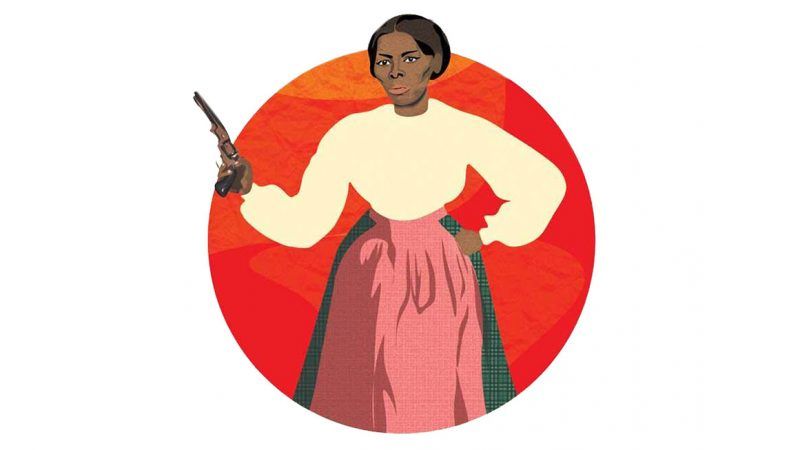She Came To Slay
The deeply human Harriet Tubman who emerges in Dunbar's book was exhausted, frustrated—and heroic.

Several biographies have humanized Harriet Tubman over the last two decades, filling in the blanks of a much-mythologized life. The most recent is She Came to Slay, by Rutgers historian Erica Armstrong Dunbar. It's pop history for young readers, but it's complex, nuanced, and more than suitable for adults.
With the Underground Railroad, Tubman directly freed around 70 slaves and helped another 70 or so reach freedom with instructions, supplies, and support. During the Civil War, in the Raid on Combahee Ferry, she helped liberate 750 more. Feats like that make her seem larger than life, but she dealt with a lot of pain too—and not just while she was enslaved.
Tubman came back south to free her husband, only to find that he had taken another wife. She came for her sister, only to learn the woman had died. She was a sought-after speaker, but at times she could barely feed her family. She thought the North would be the promised land, then learned the hard way that bigots lived in Philadelphia and New York too. The deeply human Tubman who emerges in Dunbar's book was exhausted, frustrated—and heroic.
Editor's Note: As of February 29, 2024, commenting privileges on reason.com posts are limited to Reason Plus subscribers. Past commenters are grandfathered in for a temporary period. Subscribe here to preserve your ability to comment. Your Reason Plus subscription also gives you an ad-free version of reason.com, along with full access to the digital edition and archives of Reason magazine. We request that comments be civil and on-topic. We do not moderate or assume any responsibility for comments, which are owned by the readers who post them. Comments do not represent the views of reason.com or Reason Foundation. We reserve the right to delete any comment and ban commenters for any reason at any time. Comments may only be edited within 5 minutes of posting. Report abuses.
Please to post comments


"Tubman came back south to free her husband, only to find that he had taken another wife."
Awkward for all parties.
Not in Utah...
Some irrelevant cunt who saved a whopping 70 slaves: YASSSSSSSS QWEEEEEEEEEEEEEEEEEEEEEN!!!!!!!!!!!!!!!!!!!!!!
The 400,000 white men who died in the most agonizing ways imaginable imposing abolition on the slave states in the name of perpetual union and federal supremacy: FUCK YOU CRACKA!!!!!!!!!!!!!!!!!!!!!!!!!!!!!!!!!!!!!!!!!!!!!!!!!!!!!
Speaking of sub-humans....
Open wider, Marty.
Your betters are not nearly done shoving progress down your bigoted throat.
And, if you aren't nicer, your superiors might start positioning that progress sideways before shoving.
Some irrelevant cunt who saved a whopping 70 slaves:
Stay classy asshole.
Jesus this place needs moderation.
I think I will buy this book,Definitely didn't/won't watch the movie.Too many liberties taken.
"Several biographies have humanized Harriet Tubman over the last two decades, filling in the blanks of a much-mythologized life. "
"The deeply human Tubman who emerges in Dunbar's book was exhausted, frustrated—and heroic."
It sounds like heroicizing, not humanizing. Look for closer to the source material.
Where did she stand on the issue of gay marriage?
And what about abortion?
Nice introduction to the article. But where's the rest of it?
She thought the North would be the promised land, then learned the hard way that bigots lived in Philadelphia and New York too.
Nothing's changed up here, except for the taxes being higher now.
Part of what makes America great will put Harriet Tubman on a prominent American currently shortly after the bigots' tiny fingers are removed from the levers of American executive authority.
She sounds like a clinger to me:
"Most of those coming from the mainland are very destitute, almost naked. I am trying to find places for those able to work, and provide for them as best I can, so as to lighten the burden on the Government as much as possible, while at the same time they learn to respect themselves by earning their own living."
Quoted in C. Peter Ripley, et. al. (eds.), African American Voices on race, Slavery and Emancipation (University of North Carolina Press, 1993), 245
"She Came To Slay"
Alternate Title: "She ran out of bubble gum."
She saw first hand the racism of big northern cities...it isn't surprising she lived in Auburn NY...a small Central NY manufacturing city which welcomed waves of immigrants while ensuring they "melted" into American values. As for she only saved 70 slaves....you do what you can with what you have....given the era...she did very good...and her view on work and not public welfare should be celebrated....an American Hero.
You can find viral stories on viralmummy.com
Go and check them.
Keep it up.
Dont wait any time for https://www.viralmummy.com/
Find the latest news on https://www.viralmummy.com/